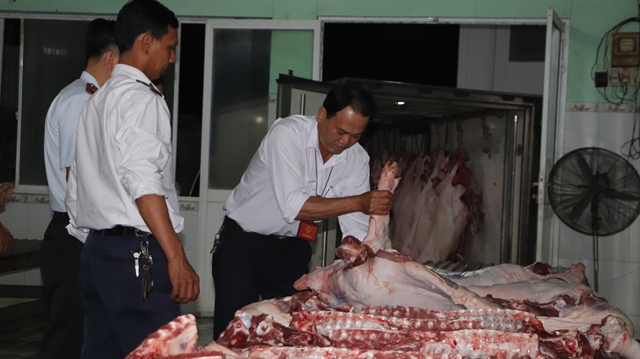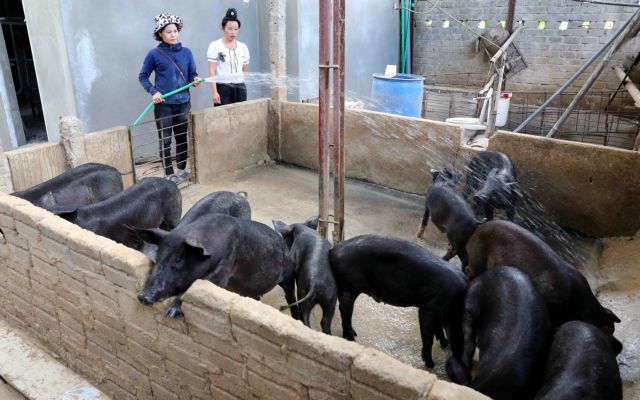 Society
Society

 |
| Farmers in the northern Điện Biên Province clean their pig pen to prevent disease. — VNA/VNS Photo Trung Kiên |
HÀ NỘI — Deputy Minister of Agriculture and Rural Development Phùng Đức Tiến stressed that prevention is better than cure, as he addressed a conference on diseases among livestock and poultry on Monday.
At the event, looking at prevention and control measures which need to be taken in the latter half of 2024, he stressed that localities must continue their efforts in addressing animal product smuggling, in addition to improving vaccination rates.
The illegal trade of livestock breeds is considered a primary reason for the spread of serious diseases such as avian influenza, blue ear disease, foot-and-mouth disease (FMD), lumpy skin disease or African swine fever, all of which severely damaged the farming industry, he said.
Deputy Minister Tiến said that local authorities must work with transport and market management agencies on this matter.
 |
| Deputy Minister of Agriculture and Rural Development Phùng Đức Tiến addresses the meeting on Monday. — VNA/VNS Photo Bích Hồng |
According to the Department of Animal Health (under the Ministry of Agriculture and Rural Development – MARD), dangerous diseases in animal husbandry have remained complex since the beginning of 2024, with the number of outbreaks and infected animals showing an upward trend compared to the same period in 2023.
In terms of avian flu, one death related to the A/H5N1 strain and one infection of A/H9N2 have been reported.
A total of 44 people across the country died from rabies (a 30 per cent rise), while nearly 97,000 people were treated for wounds inflicted by potentially rabid animals.
Equally concerning is that outbreaks of foot-and-mouth doubled, while the number of African swine fever clusters increased 2.4 fold, with the most severe clusters in the provinces of Bắc Kạn, Lạng Sơn, Quảng Nam and Quảng Ninh.
In a recent dispatch sent to leaders of provinces and centrally-run cities and several ministries, Prime Minister Phạm Minh Chính ordered a concerted, drastic and effective implementation of solutions to prevent and control diseases in the livestock sector.
The chairs of the local people's committees were asked to direct and mobilise legal resources to handle outbreaks and prevent new ones from arising, culling all infected or suspected of being diseased animals.
They were ordered to take measures to support affected farmers, while also promptly detecting, preventing and handling cases of trading and transporting sick animals, as well as improper culling that spreads diseases and pollutes the environment.
At least 80 per cent of the total available livestock must be inoculated as soon as possible, the Government leader stressed, ordering a timely vaccination programme against avian influenza, rabies and African swine fever, among others.
Phan Quang Minh, deputy director of the Department of Animal Health, said that the risk of widespread African swine fever is very high, as farmers often try to quickly repopulate their herds to take advantage of rising pork prices.
The local vaccination drive is still modest in terms of both scale and finances, while some farmers don’t practise fundamental veterinary hygiene for disease prevention and control.
Culling of infected animals is also challenging due to the shortage of veterinary practitioners, as well as a lack of funding for chemicals and equipment required.
The Department of Animal Health is now working with localities to monitor disease situations and implement five national programmes to control illnesses among animal husbandry.
The department also stressed active supervision of the transmission of diseases within markets, vaccination efficiency and evaluation.
An epidemiological map of dangerous diseases among livestock and poultry is also expected to be developed as a guide for prevention and control efforts and to enhance testing capacities.
Specialised units and localities need to guide livestock and poultry owners to get them to use safe farming techniques and prevent diseases through hygiene, disinfection and pest control.
Local authorities must also be proactive in detecting dangerous outbreaks for prompt warning and handling.
The focus will be on developing disease-free farming areas and value chains, especially those responding to the standards demanded by the World Organisation for Animal Health (WOAH) for exports. — VNS